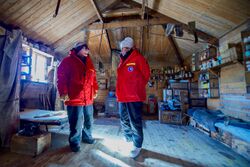Biography:Scott G. Borg
Scott G. Borg is an American geologist and civil servant. Since 1 September 2017 he has been the Deputy Assistant Director of the Directorate for Geosciences at the United States' National Science Foundation (NSF).[1][2]
Education
Borg graduated from Pomona College with a B.A. in geology, and earned M.S. and Ph.D. degrees from Arizona State University, where his doctoral dissertation was titled Granitoids of Northern Victoria Land, Antarctica (Tectonics, Neodymium-isotopes, Geochemistry, Petrology, Strontium-isotopes).[3][4]
Career
He began his career as a researcher at the University of California at Berkeley.[3] He later worked for the United States Department of Energy, and subsequently joined the staff of the National Science Foundation.[3][5] Between 2003 and 2016 he was director of the Division of Antarctic Sciences at the National Science Foundation,[5] and in 2016-17 he served as the acting Section Head for Antarctic Infrastructure and Logistics (AIL) within the National Science Foundation Division of Polar Programs.[3][6] In 2017, he began serving as associate director for geosciences at the National Science Foundation.[3][7][8]
Research expeditions
Borg has participated in a total of six research expeditions to Antarctica, four of which he has led.[3] During a 1978–1979 expedition in which he participated, the Sagehen Nunataks were first visited, receiving their name from the Pomona Sagehens, athletic moniker of Borg's alma mater Pomona College.[9] During the same expedition, Borg named Tongue Peak, choosing the name from a tongue-shaped moraine on the peak.[10]
Awards and honors
In 1994, Borg Bastion, the summit on Johns Hopkins Ridge, was named in his honor.[11] Borg has received the Samuel J. Heyman Medal from the Partnership for Public Service and been decorated with the Presidential Rank Award of Distinguished Executive.[6][12] In 2014, United States Representative Gerald Connolly read a statement of recognition into the Congressional Record in which he credited Borg with overseeing "the development of clean drilling technology that retrieved the first-ever pure water samples from an Antarctic lake a half mile below the surface of ice sheet ... [which] may enable researchers to understand what types of life can survive on other worlds".[12]
References
- ↑ "Borg appointed temporary Geosciences assistant director". US National Science Foundation. https://www.nsf.gov/news/news_summ.jsp?cntn_id=243081&org=OPP. Retrieved 1 October 2018.
- ↑ "Staff Directory, Directorate for Geosciences (GEO/OAD)". US National Science Foundation. https://www.nsf.gov/staff/staff_list.jsp?org=GEO&from_org=GEO. Retrieved 1 October 2018.
- ↑ 3.0 3.1 3.2 3.3 3.4 3.5 "Biographical Sketch Scott G. Borg". University of Vermont. https://www.uvm.edu/~epscor/pdfFiles/2008_Annual_Meeting/Borg_Scott.pdf. Retrieved March 3, 2018.
- ↑ "Borg, Scott 1984". Arizona State University. https://search.lib.asu.edu/primo-explore/fulldisplay?docid=TN_proquest303321950&context=PC&vid=01ASU&lang=en_US&search_scope=Everything&adaptor=primo_central_multiple_fe&tab=default_tab&query=any,contains,Scott%20Borg&sortby=rank&facet=rtype,include,dissertations&offset=0. Retrieved March 3, 2018.
- ↑ 5.0 5.1 Somers, Meredith (April 29, 2016). "Scott Borg: Passion for science, education not cooling anytime soon". WFED. https://federalnewsradio.com/public-service-recognition-week/2016/04/scott-borg-passion-science-education-not-cooling-anytime-soon/. Retrieved March 3, 2018.
- ↑ 6.0 6.1 "Senior Executive Service Presidential Rank Awards 2015". United States Government. https://www.opm.gov/policy-data-oversight/senior-executive-service/presidential-rank-awards/2015/agency/national-science-foundation/. Retrieved October 1, 2018.
- ↑ Mervis, Jeffrey (February 27, 2017). "Departing senior NSF manager offers hopeful assessment of agency's future". Science Magazine. http://www.sciencemag.org/news/2017/02/departing-senior-nsf-manager-offers-hopeful-assessment-agency-s-future. Retrieved March 3, 2018.
- ↑ "Steering Committee on Agency Reform". US National Science Foundation. https://www.nsf.gov/oirm/bocomm/meetings/spring_2017/SCAR_Member_Bios_for_BOAC.pdf. Retrieved 1 October 2018.
- ↑ "Sagehen Nunataks". Commonwealth of Australia. https://data.aad.gov.au/aadc/gaz/display_name.cfm?gaz_id=131119. Retrieved March 4, 2018.
- ↑ "Tongue Peak". Commonwealth of Australia. https://data.aad.gov.au/aadc/gaz/display_name.cfm?gaz_id=132773. Retrieved March 4, 2018.
- ↑ "GNIS - Antarctica Detail". United States Government. https://geonames.usgs.gov/apex/f?p=gnispq:5:0::NO::P5_ANTAR_ID:1681. Retrieved March 3, 2018.
- ↑ 12.0 12.1 "Recognizing the Contributions and Career Achievements of Dr. Scott Gerald Borg". Congressional Record 160 (137). 2014. https://www.congress.gov/congressional-record/2014/11/12/extensions-of-remarks-section/article/E1547-2.


